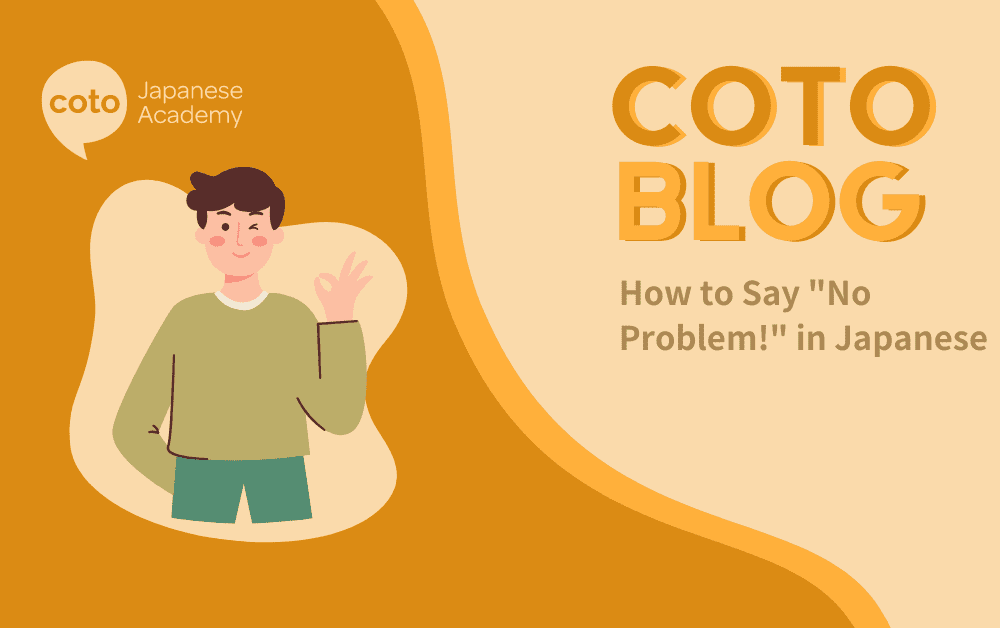Check out all the ways to say “No problem!” in Japanese. The next time a frail-looking oji-san bumps into you and apologizes, you can say something besides the usual “だいじょうぶです”.
問題ない (Mondai nai)
Mondai nai is the literal way to say “No problem.” 問題 (もんだい) means ‘problem’ and ない means ‘there is not’. Do note that ない is spoken in casual speech, and it should be replaced by ありません (arimasen) to be used in formal situations.
大丈夫 (Daijoubu)
If you watch anime, you have probably heard this phrase over a thousand times. 大丈夫 (だいじょうぶ) means “It’s okay” or “It’s not a problem” as a response to someone else. For example, you can use it when a waiter offers water at a restaurant, and you want to reject them politely. Adding です desu to the end makes 大丈夫 more formal. You can see other ways to use 大丈夫 here.
お水はいかがでしょうか。
Omizu wa ikaga deshouka?
Would you like (a glass of) water?
だいじょうぶです!
Daijoubu desu!
It’s alright!
構わない/かまわない (Kamaimasen/kamawa nai)
It is also another casual way to express no problem in Japanese. The phrase translates to “It doesn’t matter”. 構わない is mainly used in formal conversations, while かまわない in informal.
You can also add the Japanese adverb ぜんぜん or まったくto tell the listener that it is not a problem at all.
窓を閉めてもいいですか。
Mado o shimetemo ii desu ka.
Can I open the window?
全然構いませんよ。
Zenzen kamaimasen yo.
It doesn’t matter at all.
全然いいよ (Zenzen ii yo)
ぜんぜん is used to emphasize that something is not at all. Usually, we associate it with negative expressions. However, it is entirely acceptable to use it for affirmative words like いいよ (ii yo). This helps make a conversation more casual.
ごめんね。財布を忘れた。本当に頼んでくれた。
Gomen ne. Saifu wo wasureta. Hontou ni tanonde kureta.
I’m sorry. I forgot my wallet. You really helped me.
ぜんぜんいいよ。
Zenzen ii yo.
No problem.
オーケー (Ookee)
It’s a Japanese loanword from the English “Okay.” When you’re reminded to do something, you can reply by saying “hai” (はい), which is the most basic way to give affirmation or オーケー. Be careful, though. While it’s completely okay to use the word to your boss in English, saying “オーケーです!” sounds informal. Sure, it sounds upbeat and cheerful, but use it with caution.
Often, it is written simply as OK. You’ll find the word everywhere: in advertisements, takeout corners, and menus.
テイクアウト、イートインどちらでもOK!
Teiku auto, iito in dochira de mo oke!
Take out or eat-in, either is okay!
気にしないで (Ki ni shinaide)
It’s the informal form of 気にしないでください. This phrase assures someone that what you did was not a problem and that they do not have to concern themselves with it. Adding ね (ne) at the end makes it extra casual.
落としちゃってすみませんでした!
Otoshichatte sumimasen deshita!
I’m sorry that I dropped it!
いいよ。気にしないで。
Iie. Ki ni shinaide.
It’s okay. Please don’t worry about it.
いえいえ (Ieie)
This phrase literally translates to “No, no.” Japanese people are known for their humility. Rather than accepting a compliment or thank you, they will instead deny it as a way to be polite. When you say “You’re welcome”, it can appear as if you’re self-congratulating. We use いえいえ to let them know that they don’t need to thank us.
田中先生のおかげで、テストに合格しました。ありがとうございました!
Tanaka-sensei no okage de, tesuto ni goukaku shimashita. Arigatou gozaimashita!
Because of Tanaka-sensei, I passed the test. Thank you!
いえいえ。
Ie ie.
Not at all!
ドンマイ (Donmai)
This is slang that you may have heard often in sports anime. Characters will use it to motivate someone when they feel down or make mistakes on behalf of their team. For example, when your teammate misses a throw at a basketball match or kicks a ball out, you will say, “ドンマイ” to lift their spirit up.
ドンマイ is actually a loanword taken from the English “Don’t mind”.
やばい! ピッチャーがホームランを打たれた!
Yabai! Pitchaa ga hoomu ran o utareta!
Oh no! The pitcher hit home run!
ドンマイ!
Donmai!
Don’t mind it!
How to say “No Problem” FAQs
How to say "No Problem" in Japanese?
Mondai nai is the literal way to say “No problem.” 問題 (もんだい) means ‘problem’ and ない means ‘there is not’. Do note that ない is spoken in casual speech and it should be replaced by ありません (arimasen) to be used in formal situations.
Studying Japanese? Take the Free Japanese Level Assessment Test
At Coto Japanese Academy (our Tokyo, Yokohama, and online language school), we want you to learn “real” conversational Japanese. We want to hear more about your goal, preference, and Japanese level. Sign up for a free level assessment and lesson consultation.
Coto Japanese Academy is a unique Japanese Language School in Iidabashi Tokyo. We offer relaxed and fun conversational lessons for all levels of Japanese learners. Coto Japanese Academy prides itself on its community atmosphere and fun lessons that focus on the creation of opportunities to speak and learn Japanese. If you are interested in studying Japanese in Tokyo, please visit our contact page.
